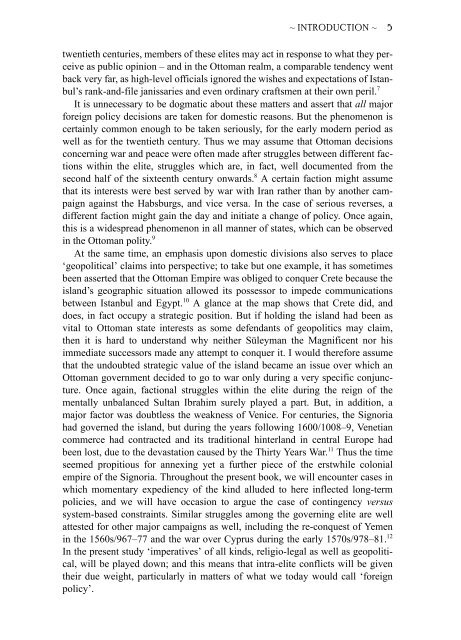The Ottoman Empire and the World Around It - Course Information
The Ottoman Empire and the World Around It - Course Information
The Ottoman Empire and the World Around It - Course Information
Create successful ePaper yourself
Turn your PDF publications into a flip-book with our unique Google optimized e-Paper software.
~ INTRODUCTION ~ 5<br />
twentieth centuries, members of <strong>the</strong>se elites may act in response to what <strong>the</strong>y perceive<br />
as public opinion – <strong>and</strong> in <strong>the</strong> <strong>Ottoman</strong> realm, a comparable tendency went<br />
back very far, as high-level officials ignored <strong>the</strong> wishes <strong>and</strong> expectations of Istanbul’s<br />
rank-<strong>and</strong>-file janissaries <strong>and</strong> even ordinary craftsmen at <strong>the</strong>ir own peril. 7<br />
<strong>It</strong> is unnecessary to be dogmatic about <strong>the</strong>se matters <strong>and</strong> assert that all major<br />
foreign policy decisions are taken for domestic reasons. But <strong>the</strong> phenomenon is<br />
certainly common enough to be taken seriously, for <strong>the</strong> early modern period as<br />
well as for <strong>the</strong> twentieth century. Thus we may assume that <strong>Ottoman</strong> decisions<br />
concerning war <strong>and</strong> peace were often made after struggles between different factions<br />
within <strong>the</strong> elite, struggles which are, in fact, well documented from <strong>the</strong><br />
second half of <strong>the</strong> sixteenth century onwards. 8 A certain faction might assume<br />
that its interests were best served by war with Iran ra<strong>the</strong>r than by ano<strong>the</strong>r campaign<br />
against <strong>the</strong> Habsburgs, <strong>and</strong> vice versa. In <strong>the</strong> case of serious reverses, a<br />
different faction might gain <strong>the</strong> day <strong>and</strong> initiate a change of policy. Once again,<br />
this is a widespread phenomenon in all manner of states, which can be observed<br />
in <strong>the</strong> <strong>Ottoman</strong> polity. 9<br />
At <strong>the</strong> same time, an emphasis upon domestic divisions also serves to place<br />
‘geopolitical’ claims into perspective; to take but one example, it has sometimes<br />
been asserted that <strong>the</strong> <strong>Ottoman</strong> <strong>Empire</strong> was obliged to conquer Crete because <strong>the</strong><br />
isl<strong>and</strong>’s geographic situation allowed its possessor to impede communications<br />
between Istanbul <strong>and</strong> Egypt. 10 A glance at <strong>the</strong> map shows that Crete did, <strong>and</strong><br />
does, in fact occupy a strategic position. But if holding <strong>the</strong> isl<strong>and</strong> had been as<br />
vital to <strong>Ottoman</strong> state interests as some defendants of geopolitics may claim,<br />
<strong>the</strong>n it is hard to underst<strong>and</strong> why nei<strong>the</strong>r Süleyman <strong>the</strong> Magnificent nor his<br />
immediate successors made any attempt to conquer it. I would <strong>the</strong>refore assume<br />
that <strong>the</strong> undoubted strategic value of <strong>the</strong> isl<strong>and</strong> became an issue over which an<br />
<strong>Ottoman</strong> government decided to go to war only during a very specific conjuncture.<br />
Once again, factional struggles within <strong>the</strong> elite during <strong>the</strong> reign of <strong>the</strong><br />
mentally unbalanced Sultan Ibrahim surely played a part. But, in addition, a<br />
major factor was doubtless <strong>the</strong> weakness of Venice. For centuries, <strong>the</strong> Signoria<br />
had governed <strong>the</strong> isl<strong>and</strong>, but during <strong>the</strong> years following 1600/1008–9, Venetian<br />
commerce had contracted <strong>and</strong> its traditional hinterl<strong>and</strong> in central Europe had<br />
been lost, due to <strong>the</strong> devastation caused by <strong>the</strong> Thirty Years War. 11 Thus <strong>the</strong> time<br />
seemed propitious for annexing yet a fur<strong>the</strong>r piece of <strong>the</strong> erstwhile colonial<br />
empire of <strong>the</strong> Signoria. Throughout <strong>the</strong> present book, we will encounter cases in<br />
which momentary expediency of <strong>the</strong> kind alluded to here inflected long-term<br />
policies, <strong>and</strong> we will have occasion to argue <strong>the</strong> case of contingency versus<br />
system-based constraints. Similar struggles among <strong>the</strong> governing elite are well<br />
attested for o<strong>the</strong>r major campaigns as well, including <strong>the</strong> re-conquest of Yemen<br />
in <strong>the</strong> 1560s/967–77 <strong>and</strong> <strong>the</strong> war over Cyprus during <strong>the</strong> early 1570s/978–81. 12<br />
In <strong>the</strong> present study ‘imperatives’ of all kinds, religio-legal as well as geopolitical,<br />
will be played down; <strong>and</strong> this means that intra-elite conflicts will be given<br />
<strong>the</strong>ir due weight, particularly in matters of what we today would call ‘foreign<br />
policy’.


